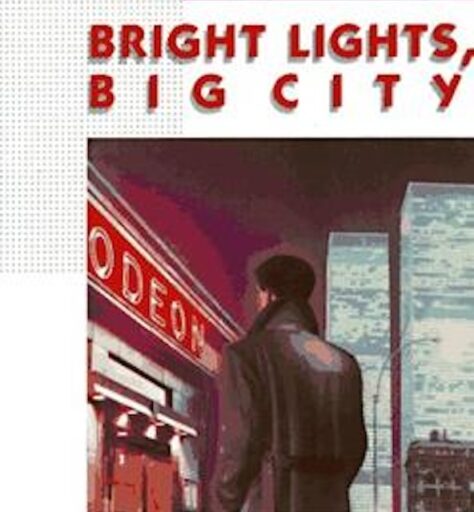My older brother tells a funny story about attending the funeral of an acquaintance at his Catholic parish in Jackson, Mississippi. He arrived in a solemn, reverential mood, ready to commemorate the life of the departed, but with every movement of the service, he became more and more irked. Every single one of the pieces of music were ones that he had been planning in his head for his own funeral. And this person had just stolen them!
That’s more or less how I felt when I saw that The Free Press, the Bari Weiss-led Intellectual Dark Web outlet (yes, I am a paid subscriber) put up a notice that the subject of TFP’s inaugural book club was going to be a discussion of the new book Triumph of the Yuppies: America, the Eighties, and the Creation of an Unequal Nation, in conjunction with the fortieth anniversary of the novel Bright Lights, Big City, by Jay McInerney.
But I’d already decided to write about McInerney’s novel—before TFP’s book club chose it!
2024 marks the fortieth anniversary since the publication of Bright Lights, Big City. It was the first book by Jay McInerney, and probably to his chagrin, the one for which he is still known the most. (Whereas his partner in zeitgeist-iness, Bret Easton Ellis, whose own first novel Less Than Zero has typically been lumped together with Bright Lights, has gone on to a number of second-acts-in-American-lives, first with the American Psycho phenomenon and more recently as a free speech advocate—celebrated in none other than The Free Press.)
If you know anything about it at all, you probably remember the novel’s signature reference to cocaine as “Bolivian Marching Powder,” in which the twenty-something male protagonist, in the middle of an emotional breakdown, indulges off a parade of mirrors and in nightclub bathrooms. That’s the other part of the book you probably remember, the book as a synecdoche for a whole downtown, Eighties vibe. That was underscored by the New Wave, Patrick Nagel-y cover design of the original Vintage Contemporaries publication. (Vintage Contemporaries themselves also of the zeitgeist.)
Forty years later, that remains the main takeaway for a lot of people, with “Bolivian Marching Powder” a bit of piquant flavoring. It’s worth, though, teasing out the analogy as elegantly as McInerney does, when the protagonist “you” finds himself at a low ebb:
Somewhere back there you could have cut your losses, but you rode past that moment on a comet trail of white powder and now you are trying to hang on to the rush. Your brain at this moment is composed of brigades of tiny Bolivian soldiers. They are tired and muddy from their long march through the night. There are holes in their boots and they are hungry. They need to be fed. They need the Bolivian Marching Powder.
It’s an effective analogy, however dubious its referent activity might be. The problem with the Bolivian Marching Powder coinage, though, is that it disguises the true nature of Bright Lights, Big City. I just reread the book, and it was a different one than the one I’d read in college.
What was different? There are the aspects that are striking because they are anachronistic. Some of these are, depending on your mileage, ideological: this is New York City, but there are no people of color, per se; and there’s a fair amount of casual homophobia tossed about, although that would be expected from someone kind of bro-ey.
Then there are a couple of instances where examples of writing and language bolster my confidence that a knowledgeable captain is at the helm of the narrative: In an aside where the protagonist mentions that his wife wanted to buy an Upper East Side apartment they could ill afford, he recalls that she “brought home prospecti for co-ops” that were out of their range.
Finally, there are the ones that simply mark all that’s changed in the past forty years, and which, for those of us of a certain age, spur an instant of haunting recognition. For example, at one point amid his life’s dissolution, the protagonist “you” opens his apartment mailbox:
Tonight there is an overdue notice from VISA; a solicitation from Recording for the Blind; a letter from Jim Winthrop in Chicago, college roommate, best man at your wedding…. You open Jim’s letter first. It starts ‘Hey stranger’ and ends with ‘regards to Amanda’….
We could get the credit card notice now, and the fundraising solicitation, and maybe a condolence note on 100% Crane cotton, but we’d never, ever get the ordinary casual letter. (Just reading that, in fact, made me feel a sudden weight of dread and loss.)
But that last kind of thing, in the end, is just me and my own generational regrets and predilections.
What’s not about me, though, is a book that, for all its purported flash, is as solidly composed as a wooden table (even though I still don’t love the gimmicky second person). The protagonist is unhappily employed in The Department of Factual Verification at a magazine a lot like The New Yorker, and there’s a lot about the process of work and what it feels like to be floundering in it.
There’s also a tight narrative economy as the book begins in media res of the protagonist’s troubles, then traces his stumbling toward, if not exactly redemption, then at least understanding. And there’s a perceptible move from his moral formlessness—encapsulated by his Mephistophelean sidekick and Bolivian Marching Powder-supplier friend Ted Allagash—toward the recovery of a stability and ethical rectitude.
A careful reader might find all kinds of resonances, both to contemporaneous literature and to works that have come in the forty years since. It wasn’t until I read the book this time, for example, that I noticed that there is quite a large parallel with the end of a very famous short story by his Vintage Contemporaries colleague Raymond Carver.
And in tone and stance, its perplexed male subject feels like nothing less than an antecedent of the central male narrator in the novel I wrote about in my last post, The Index of Self-Destructive Acts.
Your mileage may vary, and it may be that I am seeing these things everywhere because I have a son right at the dawn of his twenties, and who’s beginning to navigate all the questions about how to be a man, a good man, in a superficial and tawdry world.
That’s as relevant today as it was in 1984—even if our digital snares seem so much more seductive and depressing. “Hey,” I shout from my perch on the sofa. “I’ve got something you’ve got to read.”
Caroline Langston was a regular contributor to Image’s Good Letters blog, and is writing a memoir about the U.S. cultural divide. She has contributed to Sojourners’ God’s Politics blog, and aired several commentaries on NPR’s All Things Considered, in addition to writing book reviews for Image, Books and Culture, and other outlets. She is a native of Yazoo City, Mississippi, and a convert to the Eastern Orthodox Church. She lives outside Washington, D.C., with her husband and two children.





